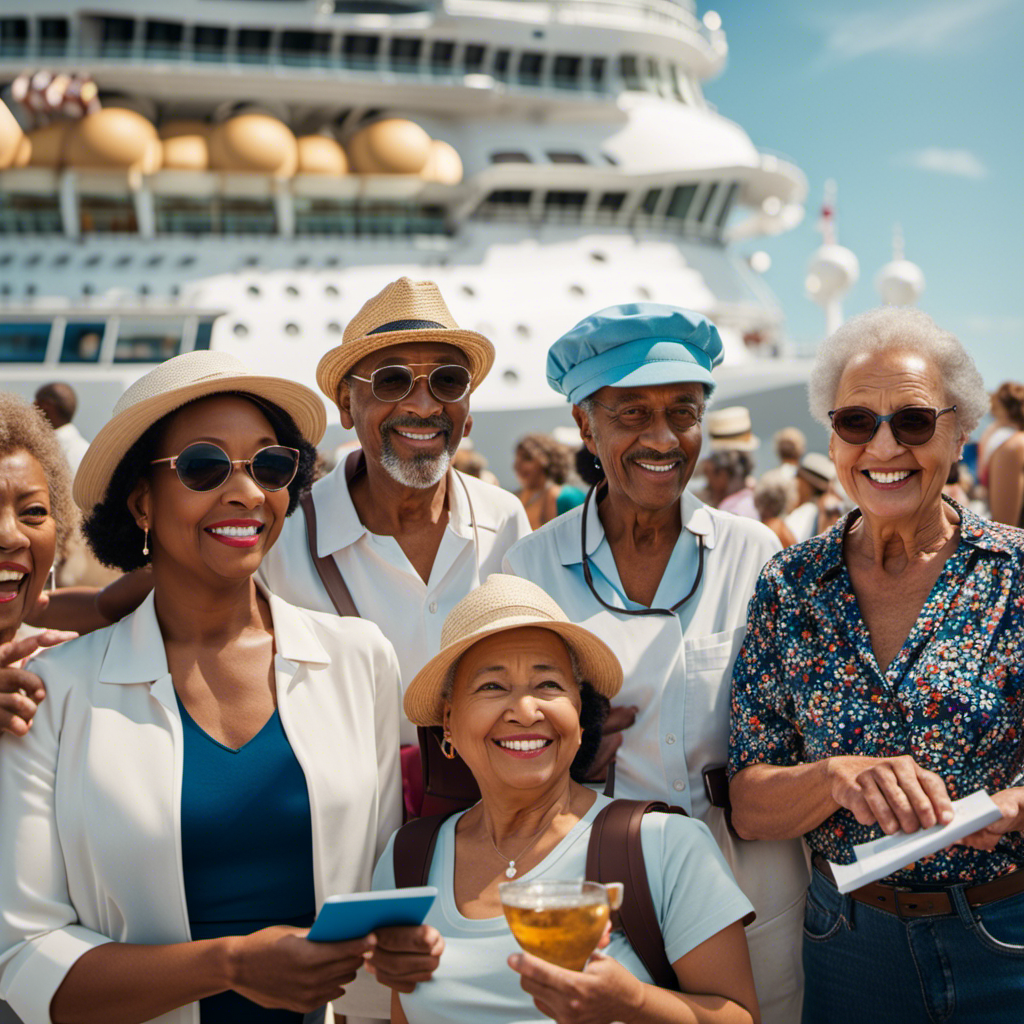You might be questioning, ‘Why should I care about the vaccine policies on cruise ships?’ Let me tell you why it’s actually more important than you might first think.
With the return of cruising amidst the ongoing pandemic, understanding these policies is crucial for anyone planning to set sail. From Carnival Cruise Line’s relaxed approach to Royal Caribbean’s vaccination requirements, each major cruise line has its own rules in place.
In this article, we’ll delve into the specifics of these policies, accepted vaccines, timing requirements, and even the impact of Florida’s executive order on vaccine checking in ports.
So buckle up and get ready to navigate the world of cruise line vaccine policies.
Key Takeaways
- Carnival Cruise Line allows both vaccinated and unvaccinated passengers to sail freely starting September 6, 2022, with unvaccinated passengers requiring a negative test within three days of cruising.
- Royal Caribbean requires vaccination for passengers aged 12 and older departing from Florida and some other ports, while proof of vaccination is still requested for all passengers even if not required.
- Norwegian Cruise Line no longer requires passengers to be vaccinated, but unvaccinated passengers over 12 years old need a negative test within 72 hours of embarkation.
- Princess allows passengers to sail without the vaccine but requires testing before boarding, with vaccinated guests on certain itineraries exempt from testing. Unvaccinated guests on those itineraries need to self-test within three days of sailing.
Major Cruise Line Policies
Carnival Cruise Line allows all passengers, including unvaccinated individuals, to sail freely starting September 6, 2022. However, unvaccinated passengers are required to have a negative test taken within three days of cruising. This testing requirement ensures the safety of all onboard.
It is important to note that while Carnival Cruise Line offers exemptions for unvaccinated passengers, they still prioritize the health and well-being of their guests and crew. By implementing this testing requirement, the cruise line aims to minimize the risk of COVID-19 transmission and provide a safe environment for everyone onboard.
These measures are in line with industry-wide efforts to adapt to the changing circumstances and ensure a smooth and enjoyable cruising experience for all passengers, vaccinated or not.
U.S. Cruise Line Policies
As a passenger, it is crucial to be aware of the vaccination and testing requirements of different U.S. cruise lines.
Currently, major U.S. cruise lines are working to relax testing and vaccination protocols for all guests, prioritizing the health and safety of guests, crew, and destinations.
However, it is important to note that some cruise lines have specific vaccine requirements. For example, MSC and Disney Cruise Line have specific vaccine requirements in place. Additionally, Virgin Voyages allows a small percentage of passengers to sail unvaccinated with an exemption.
The impact of these vaccine exemptions on the travel industry is still uncertain. It remains to be seen whether these exemptions will lead to legal actions against the CDC and federal government or affect the cruising industry in Florida and the U.S. overall.
Accepted Vaccines and Proof of Vaccination
I can provide information on which vaccines are widely accepted and what proof of vaccination is required by cruise lines. Here are the key points:
-
Accepted Vaccines:
- Major vaccines like Pfizer, Moderna, Johnson & Johnson, and AstraZeneca are widely accepted by most cruise lines.
- Some cruise lines may have specific requirements for accepted vaccines, so it’s essential to check their guidelines before booking.
-
Proof of Vaccination:
- The most common way to prove vaccination is by presenting the CDC vaccination card.
- Some cruise lines accept digital records or images of the vaccination card as an alternative proof of vaccination.
- Vaccine passports, which are digital records that provide proof of vaccination, are becoming more widely accepted by cruise lines as well.
It’s important to stay updated on the latest vaccine passport requirements and alternative proof of vaccination options as cruise line policies may change.
Vaccination Timing and Requirements
Passengers who plan to cruise should ensure that they are fully vaccinated, with the second dose received at least 14 days prior to sailing. It is important to follow the vaccine administration guidelines and timing to ensure optimal protection against COVID-19.
Most cruise lines require passengers to be fully vaccinated as part of their health and safety protocols. The vaccines currently available, such as Pfizer, Moderna, Johnson & Johnson, and AstraZeneca, have shown high efficacy in preventing severe illness and hospitalization.
It is crucial to note that vaccines may have some side effects, which are generally mild and temporary, such as fatigue, headache, or muscle pain. However, the benefits of vaccination far outweigh the risks.
Being fully vaccinated not only protects yourself but also contributes to the overall safety and well-being of fellow passengers and crew members onboard.
Return to Normalcy on Cruises and Florida’s Executive Order
Florida’s Governor DeSantis has issued an executive order regarding vaccine checking in ports, but its impact on cruising remains uncertain. The executive order has raised several questions and concerns within the cruise industry.
Here are three key points to consider:
-
Potential Outcomes: The executive order could lead to various outcomes, including no cruising in Florida or the US, no vaccine checks in Florida or the US, or legal actions against the CDC and federal government. The ultimate result will depend on how the order is interpreted and enforced.
-
Cruise Line Policies: Currently, cruise lines are following their own vaccine policies, prioritizing the health and safety of their passengers and crew. Each cruise line has its own set of requirements and protocols in place, which may differ from the executive order.
-
Uncertainty: The executive order has created uncertainty in the industry, as cruise lines navigate between complying with the order and ensuring the safety of their operations. It remains to be seen how this order will affect the return to normalcy on cruises and the overall industry’s recovery.
The situation is still evolving, and stakeholders are closely monitoring developments to determine the next steps in the cruise industry’s path forward.
Impact of Vaccine Policies on Cruising Industry
The impact of the various vaccine requirements on the cruising industry is significant and continues to shape the landscape of travel. The challenges for unvaccinated passengers are evident, as many cruise lines now require proof of vaccination or negative COVID-19 tests. This has led to a divide among passengers and public perception of vaccine policies. To provide a visual representation of these ideas, here is a table showcasing the vaccine policies of major cruise lines:
| Cruise Line | Vaccine Requirement |
|---|---|
| Carnival Cruise Line | Vaccination or negative test |
| Royal Caribbean | Vaccination required in certain ports |
| Norwegian Cruise Line | Vaccination not required, but negative test needed |
| Princess | Vaccination not required, but testing necessary |
As you can see, each cruise line has taken a different approach to vaccine policies. This has created challenges for unvaccinated passengers, who may face additional testing requirements and potential restrictions on certain itineraries. Public perception of these policies varies, with some supporting the measures as necessary for public health, while others view them as infringing on personal freedoms. Overall, the cruise industry continues to navigate these challenges while striving to provide a safe and enjoyable travel experience for all passengers.
Frequently Asked Questions
Can Children Under 12 Years Old Sail on Major Cruise Lines Without Being Vaccinated?
No, children under 12 years old cannot sail on major cruise lines without being vaccinated. Unvaccinated children may impact cruise ship safety due to the potential risk of COVID-19 transmission.
Are There Any Cruise Lines That Require All Passengers, Regardless of Vaccination Status, to Provide a Negative Test Before Boarding?
Yes, there are cruise lines that require all passengers, regardless of vaccination status, to provide a negative test before boarding. This ensures the safety of all passengers and helps to prevent the spread of COVID-19 onboard.
Are There Any Cruise Lines That Have Stricter Vaccine Requirements Than the Cdc’s Accepted Vaccines?
Yes, there are cruise lines with stricter vaccine requirements than the CDC’s accepted vaccines. Some cruise lines may require additional vaccines or higher vaccination rates among passengers to prioritize health and safety.
What Happens if a Passenger Tests Positive for COVID-19 Before Boarding a Cruise?
If I test positive for COVID-19 before boarding a cruise, I would likely not be allowed to embark. Cruise lines have passenger testing protocols in place to ensure the safety of all guests. Quarantine procedures may vary depending on the cruise line’s policies.
Are There Any Cruise Lines That Offer Exemptions for Passengers Who Cannot Receive the COVID-19 Vaccine for Medical Reasons?
Yes, there are some cruise lines that offer exemptions for passengers who cannot receive the COVID-19 vaccine for medical reasons. However, specific policies may vary, so it’s important to check with each cruise line for their individual requirements.










